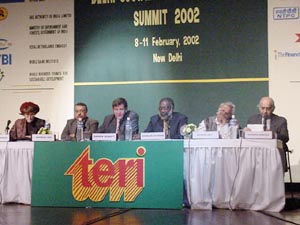
Strategies to make sustainable development and
globalization work for all sections of society must address environmental concerns and the
ability of the natural and physical environment to provide goods/services required to
support pro-poor economic growth and social development.
There is a need to realize the difference
between education and literacy and use the ‘education’ of the poor or local
traditional knowledge for development-related work. A pro-poor strategy should focus on
giving the poor their self-esteem and confidence. By taking a cross-sectoral view, poverty
reduction strategies of many developing countries can improve coordination of donor
support and investment.
Financing poverty eradication requires a shift
from a micro to a macro policy agenda, focusing on eradication rather than alleviation.
Thisnecessitates enhancing the capacity of the poor as producers, consumers, and owners of
wealth. Budgetary policy should be redesigned to reach public resources to the poor.
Organizations like the Grameen Bank (Bangladesh) should graduate into the macro-finance
system by accessing the deposits of the public and even marketing its assets at the global
level.
Financial services should be restructured to
serve the poor. An integrated monetary system is a two-way street where special
instruments can attract the poor’s micro-savings into the corporate sector (where
they can again be channelled to serve the poor) and reciprocally, corporate investments
can be directed towards fulfilling the micro-credit needs of the poor. Financial policy
should be restructured to accommodate the poor as equity partners. This is possible
through mutual funds and the transformation of private limited companies into public
limited companies.
Supporting corporate social responsibility and
building consensus on development/environmental issues can make aid and investment
meaningful. The international development community should restructure its aid priorities
to move beyond traditional welfare-oriented strategies of poverty alleviation towards
investing in graduating the resource poor into the realm of the market economy.
Much can be done to improve the use of
existing funds. Removal of wasteful subsidies in developed countries could improve trade
opportunities for poor countries and remove incentives for environmentally damaging
production systems in the North. This requires identification and use of
‘win-win’ or ‘no regrets’ opportunities. Investment must also focus on
decentralization, gender equality, and disaster prevention.
Development financing requires (1) domestic
and international private resources; (2) globalization and international trade as engines
for development; (3) development assistance, global public goods, and innovative sources
of finance; (4) debt management; (5) addressing of systemic issues; and (5) consensus and
coherence.
Incorporating or ‘mainstreaming’
sustainable development concerns into development planning/activities entails addressing
economic, social, as well as environmental dimensions. This implies a responsibility for
governments, donors, businesses, communities, civil society, and individuals. There is a
need for broad endorsement of the principles of how sustainable development should be
integrated into country programmes and policies.
|